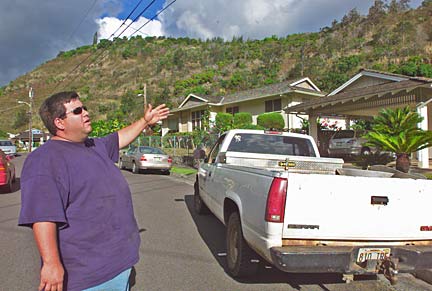
|
Army to secure
Moanalua hillsides
The Army will remove 13 large boulders from Moanalua Valley hillsides and install landslide-prevention netting in a $1.4 million project that starts Monday.
![]()

Boulders at eight locations overhanging homes on Ala Aolani Street and Ala Aoloa Loop will be removed between now and November by Prometheus Construction, under contract to the U.S. Army Corps of Engineers.
The Army is paying for the preventive work while denying legal responsibility for the Dec. 7, 2003, landslides in the valley, said state Rep. Glenn Wakai (D, Moanalua Valley-Moanalua-Salt Lake).
Those landslides brought boulders, rocks and mud down the hillside from land around Tripler Army Medical Center. There were no injuries, but 32 homeowners had property damage, Wakai said.
The slides came four months after Dara Rei Onishi, 26, was killed by a boulder in Nuuanu Valley, heightening concerns about rockfall dangers.
"Boulders seem to be falling, and we certainly don't want to be the next community where somebody's life gets taken by falling boulder," Wakai said.
He credited U.S. Sen. Daniel Inouye with getting funding for the remedial work so soon after the landslides.
"This is a great example of the Army being proactive in protecting lives and property of civilian neighbors in Moanalua Valley," Inouye said.

Brian Mahnken of Prometheus Construction pointed yesterday to the area where a safety fence will be built behind homes along Ala Aoloa Loop in Moanalua Valley.
Prometheus Construction has worked on a number of other rockfall mitigation projects in Hawaii, including a current job on Hana Highway on Maui, the Lalea townhomes in Hawaii Kai and Kalanianaole Highway at Makapuu Point.
Prometheus General Manager Cliff Tillotson said up to 10 workers will work on the Moanalua project. They will begin by installing safety fencing behind houses downhill from the work, then put catchment nets around the boulders to be removed.
The boulders will be broken into fragments small enough to remove in large sacks via helicopter, Tillotson said. That method proved effective at the Hawaiian Home Lands project at Kalawahine Stream, he said.
In the 2003 landslide, rocks and dirt slid onto the properly of Janet LeGrande, who lives on Ala Mahina Place. She said yesterday she is "absolutely" glad that the Army is paying to remove future hazards, but she hopes that it will also reconsider its refusal to help clean up from that disaster.
For example, she said, a drainage ditch behind her house still has several large boulders in it that could divert storm water toward her property if there is a big rain.
"I'd like to see them use some of money that they got to clean up," LeGrande said. "I'm still hopeful."
E-mail to City Desk
[News] [Business] [Features] [Sports] [Editorial] [Do It Electric!]
[Classified Ads] [Search] [Subscribe] [Info] [Letter to Editor]
[Feedback]
